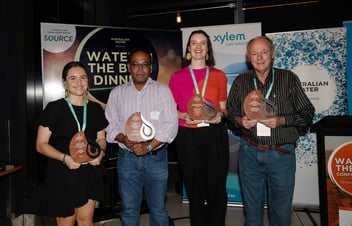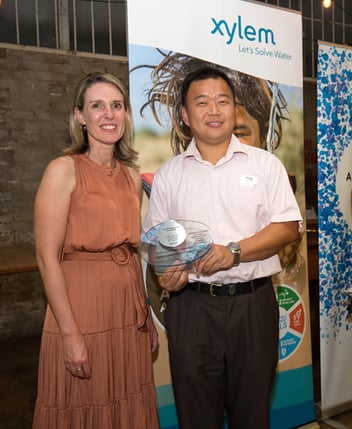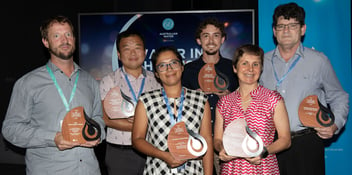2018 National Water Awards winners: Where are they now?
From the business setting new safety standards to the young water professional advancing the industry, the Australian Water Association’s (AWA) Water Awards celebrate the individuals and teams doing fantastic things in the water sector.
Each year, hundreds of water professionals compete in the state and territory awards programs, with the winners going on to vie for the national titles, which are announced at the AWA’s annual conference, Ozwater.
With nominations for the 2019 state awards now open, we take a look at what the 2018 National Water Awards winners, announced at Ozwater'18, have been up to since taking home the top prize.
Infrastructure Project Innovation Award
Sundrop Farms Project, John Holland Group (SA)
John Holland was the EPC contractor for the Sundrop Farms project, which involved the design and construction of 20 hectares of climate controlled greenhouses and a 39-Megawatt Solar Thermal Energy System. The system is used to sustainably produce 15,000 tonnes of truss tomatoes per year for markets across Australia.
Since winning the award, Mal Shepherd, General Manager, Water Services said the John Holland Water Services team has been busy listening to the issues facing its customers, in particular the impacts of climate change.
“Our people continue to apply adaptive and innovative thinking, which allows us to put forward solutions that deliver resilient and sustainable outcomes,” Shepherd said.
“We have been working to develop a significant pump hydro scheme in Queensland [and] we continue to deliver other complex projects around Australia.
“One of the most significant of these has been the 270km Wentworth to Broken Hill Pipeline project for WaterNSW, which will give drought-stricken communities secure and reliable access to water for the first time.”
The team has also completed the Sydney Desalination Plant rebuild, as Sydney moves into a period of water scarcity, and has made good progress on the Murray Bridge wastewater treatment project for SA Water.
“Winning awards such as the AWA Infrastructure Project Innovation Award is wonderful recognition of all the organisations and people involved,” Shepherd said.
“Being an award winner creates opportunities for both people and organisations to showcase to others what is possible.
“We have been able to use the project and the award recognition as an example of our capability and capacity to develop, deliver and commission projects of global significance. We have moved into international markets and the award strengthens our credentials with potential customers as we compete for new business.
“The awards present an opportunity to collaborate with clients and partners to communicate to the industry what you are doing.”
Program Innovation Award: Community Leak Program, Living Water Smart
Power & Water Corporation (NT)
Launched in January 2017, the community leak program provided community-wide leak-checking services, leak awareness campaigns and a $200 Leak Find and Fix rebate. The program has identified and fixed over a billion litres of water leaks across the community.
The project is a component of the Power and Water’s demand management program, the Living Water Smart program.
Power and Water Project Lead Jethro Laidlaw said the utility had three main drivers for launching the leak program: customers, deferring capital, and emergency response to contamination.
“By detecting billions of litres of water leaks, it’s obviously really helped our customers who are paying for this water,” Laidlaw said.
“But it also helped us defer investment on a new dam in Darwin; we managed to defer a huge capital spend.
“Furthermore, with Katherine’s surface water supply contaminated with PFAS, we wanted to ensure the water we do have is used as efficiently as possible so that we can ensure Katherine has drinkable water supplies. Our project has had a positive public health outcome as well.”
Since winning the AWA award, Power and Water went on to win a global Special Achievement Award through its software company GIS.
“GIS used us as a case study and made a video about our program, which was great,” Laidlaw said.
“We got a lot of media coverage; the NT News stopped talking about crocodiles for a minute, which is hard to do in the NT News!”
Laidlaw said the award also gave the business the opportunity to talk more about saving water, which was great for the program’s goals.
“Further to that, our customers see that Power and Water are winning awards and that we’re being recognised for customer service, which offers our corporation and our program really positive coverage,” he said.
“It’s given us a lot of exposure for what we do; it has let our customers know that we’re doing the best we can to service the community.”
Research Innovation: Purple phototrophic bacteria for resource recovery from wastewater
The University of Queensland and CRC for Water Sensitive Cities (QLD)
Developing a world-first technology for a next-generation resource recovery process, the UQ CRC for Water Sensitive Cities’ research has the potential to recover vital fertiliser compounds, bioplastics and provide a sustainable animal feed source.

Damien Batstone from the UQ’s Advanced Water Management Centre said the direction of the project has been changing.
“Originally, we were looking at treating domestic wastewater through a completely new process, able to recover nutrients and everything else,” Batstone said.
“We had the idea to digest the byproduct into methane, and run the front end of the process using the energy.
“We needed to get digestion up to 100% at the back end, to make the front end work. We’re close to that goal now, but there’s been a big shift in international focus on resource recovery with a focus on value-added products.
“So now we have changed direction; instead of just making energy, we have much more of a focus on renewable chemicals, biofeeds and other value-added products.”
He said this means the product is a lot more homogeneous and predictable.
They have active projects in a lot of areas, including using industrial wastewater and agri-industrial wastewater to generate animal feeds.
“We’re generating a biosource product, which we’ve tested as a barramundi feed, and it performed pretty well,” Batstone said.
“The aim there is to displace fish meal, which is a very high intensity product that’s not very sustainable. We’ve also received a federal government grant from Department of Agriculture to progress this work as well.”
Winning the award led to a number of opportunities, including a partnership with GHD.
“On the Ozwater’18 awards night, Tim Huelsen, our principal researcher, actually connected with GHD and AquaTech,” Batstone said.
“They went on to put together a Queensland Government fellowship, which places Tim within GHD and AquaTech over the next two years, to look at scaling up this technology. That was a contact that was made on the night, and then it was progressed over the following year.”
Water Industry Safety Excellence: FCD Skyhook Mark 4
Fremantle Commercial Diving (WA)
After several years of development, Fremantle Commercial Diving developed the Skyhook Mark 4, a unique truck mounted mobile fall arrest system, which provides a rated overhead anchor point for two people. The device set a new standard in safety for accessing elevated water tanks and is now in use around Australia.
“It’s essentially a device that we take when we need to access the roof of water tanks,” Fremantle Commercial Diving Director Antony Old said.
“It’s been an absolute game changer. It’s in huge demand and the people that use it, day in day out, just love the product because it saves them a lot of time and effort, and makes their rescue and safety capability literally as low as it can possibly be risk wise.”
Following FCD’s success at Ozwater’18, the business went on to win the WorkSafe Invention of the Year.
As well as the awards, Old said the company has been focusing heavily on another safety initiative, which is about replacing divers with robots for cleaning drinking water tanks.
“What we’ve done is develop the world’s best underwater cleaning robots, and since doing that, the uptake from the water industry has been huge,” he said.
“We’ve got robots cleaning tanks for utilities all over Australia, including Hunter Water, Icon Water, Queensland Urban Utilities and SA Water, as well as Water Corporation.
“Water Corp are now looking at working with our organisation to significantly increase the number of tanks that can be cleaned robotically.”
Old said winning the AWA award raised FCD’s profile within the water sector, and introduced the company to organisations who had significant problems they could help fix.
“We spent years, and hundreds of thousands of dollars making this ‘unicorn’ piece of kit,” Old said.
“And then all of a sudden it won a national award, and everyone went, ‘Wow, what’s this?’ Companies are now much more comfortable with letting us use our technology.”
Water Professional of the Year: Ciara Sterling
Head of Community Inclusion, Yarra Valley Water (VIC)
With over 15 years’ experience in the water industry, Ciara is an industry leader in supporting customers experiencing vulnerability, hardship and family violence. She is the driving force behind Yarra Valley Water’s extremely successful WaterCare initiative and Head of the Thriving Communities Partnership, a cross-sectoral collaboration of organisations tackling the root causes of hardship and inequality.
Young Water Professional of the Year: Katrin Doederer
Research Fellow, The University of Queensland (QLD)
Katrin demonstrated all the hallmarks of a very successful and committed early career professional. Not only has she rapidly developed from a successful PhD student to a highly regarded expert in the field of disinfection by-products in drinking water, she has also demonstrated her prowess as an effective communicator and productive project leader at the interface between research and practice.
Student Water Prize: Sarah Aucote, Flinders University (SA)
Smart monitoring for microbial risk assessment
Sarah’s Honours project investigated assays targeting mitochondrial DNA as a new and novel approach to tracking sources of faecal contamination. Sarah’s research has potential to provide a decreased cost of performing microbial risk assessments, leading to widespread improvements in monitoring and risk management, which in turn will improve Health Based Target compliance, particularly in regional areas.
Australian Stockholm Junior Water Prize: Minh Nga Nguyen, Sydney Girls High School (NSW)
Recycling waste into biochar: a sustainable wastewater filter and fertiliser for the agricultural industry
Nga’s project in biochar, a sustainable waste water filter and fertiliser for the agricultural industry, formed a model of application in which agricultural plant wastes are recycled into a multipurpose biochar charcoal.
For more information about the Australian Water Awards, click here.
A version of this story was first published as ‘Australian Water Awards’ in Current magazine April 2019.



